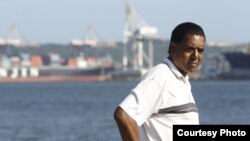Grassroots environmental activists from six regions of the world were awarded with the 2014 Goldman Environmental Prize in San Francisco Monday.
Each year the $175,000 award recognizes individuals who have shown courage and initiative against the odds to take action to protect the world.
This year's Goldman Prize winner in South Africa is Desmond D’Sa, who grew up in Durban and worked in a nearby chemical factory.
His poor working class neighborhood is surrounded by gas and oil refineries, paper mills and agrochemical plants. Half of its 300,000 residents have asthma and also suffer from high rates of cancer.
A refinery explosion sparked his activism and he began to organize against the expansion of a toxic waste dump near his neighborhood.
“We started to develop a community and create awareness," D'Sa said. "We have health workshops. We take bucket samples to ensure they know what’s causing all the illnesses. So we have developed the knowledge base. We have agitated. We have lobbied. We were able for the first time in the history of this country to get the industry bosses to be held accountable for their actions.”
The landfill was forced to close and, despite threats to his life and property, the Goldman award winner is now fighting the expansion of Durban’s port, which would displace thousands of people without compensation, while also increasing pollution.
“We’ve shown that as a united force, you can stop environmental racism," he said. "And we’ve shown communities that there needs to be a new way of doing business.”
Indonesian biologist Rudi Putra is the Goldman laureate representing the world’s island nations, where the majority of the world’s palm oil is grown. The oil is in everything from cookies, chocolate and baby formula to cosmetics and soap products.
Palm oil plantations are replacing the forests in Sumatra, one of the most bio-diverse regions of the world. So Putra has turned his own chain saw on illegal operations, cutting down the trees on nearly 500 hectares. Putra has succeeded in getting village chiefs, local officials and the police to join him on his crusade. But, he says, there is much more to do.
“Recently we started an international petition against damage to the ecosystem, and we got over 1.4 million signatures worldwide, which were submitted to the Indonesian government to cancel their plans to develop the rainforest here," Putra said. "We are determined to win this battle, too.”
Europe is represented in the Goldman Awards by zoologist Suren Gazaryan from Russia. Gazaryan made headlines with his challenge to former president Dmitry Medvedev, who had wanted to build a luxury home in a nature reserve in forested land near the Black Sea. President Vladimir Putin had stripped the area of its protected status to allow the project to go ahead. Gazaryan organized a blockade to halt it.
“We started a social media campaign against the project that recruited 10,000 people," Gazaryan said. "This showed the public that the very people responsible for creating these laws were the first to violate them. Looking forward my main goal is to continue to try to change people’s consciousness, so that they better understand that nature isn’t something we can just sell off and get rich on. We have to preserve these places for future generations.”
Gazaryan won that battle and returned again to the Black Sea to fight construction of a summer house for Putin, in a protected old-growth forest. Here, he was falsely accused of threatening security guards. Rather than face prison time, Gazaryan fled to Estonia where he continues his environmental work.
Other Goldman prize winners include Ramesh Agrawal from India who, from his small Internet café, began a successful campaign to halt a huge coal mining project in an area already distrurbed by pollution; Ruth Buendia from Peru, who stood up to dam construction that would have uprooted indigenous people; and American attorney Helen Slottje, who used the law to defend many towns targeted by gas drilling operations.
Now in its 25th year, the Goldman Environmental Prize has been awarded to 163 activists from 82 countries.
Each year the $175,000 award recognizes individuals who have shown courage and initiative against the odds to take action to protect the world.
This year's Goldman Prize winner in South Africa is Desmond D’Sa, who grew up in Durban and worked in a nearby chemical factory.
His poor working class neighborhood is surrounded by gas and oil refineries, paper mills and agrochemical plants. Half of its 300,000 residents have asthma and also suffer from high rates of cancer.
A refinery explosion sparked his activism and he began to organize against the expansion of a toxic waste dump near his neighborhood.
“We started to develop a community and create awareness," D'Sa said. "We have health workshops. We take bucket samples to ensure they know what’s causing all the illnesses. So we have developed the knowledge base. We have agitated. We have lobbied. We were able for the first time in the history of this country to get the industry bosses to be held accountable for their actions.”
The landfill was forced to close and, despite threats to his life and property, the Goldman award winner is now fighting the expansion of Durban’s port, which would displace thousands of people without compensation, while also increasing pollution.
“We’ve shown that as a united force, you can stop environmental racism," he said. "And we’ve shown communities that there needs to be a new way of doing business.”
Indonesian biologist Rudi Putra is the Goldman laureate representing the world’s island nations, where the majority of the world’s palm oil is grown. The oil is in everything from cookies, chocolate and baby formula to cosmetics and soap products.
Palm oil plantations are replacing the forests in Sumatra, one of the most bio-diverse regions of the world. So Putra has turned his own chain saw on illegal operations, cutting down the trees on nearly 500 hectares. Putra has succeeded in getting village chiefs, local officials and the police to join him on his crusade. But, he says, there is much more to do.
“Recently we started an international petition against damage to the ecosystem, and we got over 1.4 million signatures worldwide, which were submitted to the Indonesian government to cancel their plans to develop the rainforest here," Putra said. "We are determined to win this battle, too.”
Europe is represented in the Goldman Awards by zoologist Suren Gazaryan from Russia. Gazaryan made headlines with his challenge to former president Dmitry Medvedev, who had wanted to build a luxury home in a nature reserve in forested land near the Black Sea. President Vladimir Putin had stripped the area of its protected status to allow the project to go ahead. Gazaryan organized a blockade to halt it.
“We started a social media campaign against the project that recruited 10,000 people," Gazaryan said. "This showed the public that the very people responsible for creating these laws were the first to violate them. Looking forward my main goal is to continue to try to change people’s consciousness, so that they better understand that nature isn’t something we can just sell off and get rich on. We have to preserve these places for future generations.”
Gazaryan won that battle and returned again to the Black Sea to fight construction of a summer house for Putin, in a protected old-growth forest. Here, he was falsely accused of threatening security guards. Rather than face prison time, Gazaryan fled to Estonia where he continues his environmental work.
Other Goldman prize winners include Ramesh Agrawal from India who, from his small Internet café, began a successful campaign to halt a huge coal mining project in an area already distrurbed by pollution; Ruth Buendia from Peru, who stood up to dam construction that would have uprooted indigenous people; and American attorney Helen Slottje, who used the law to defend many towns targeted by gas drilling operations.
Now in its 25th year, the Goldman Environmental Prize has been awarded to 163 activists from 82 countries.






